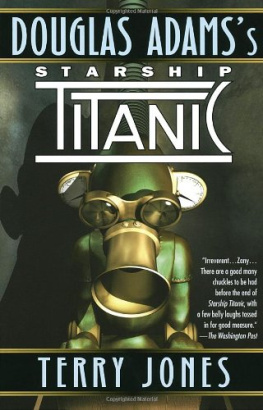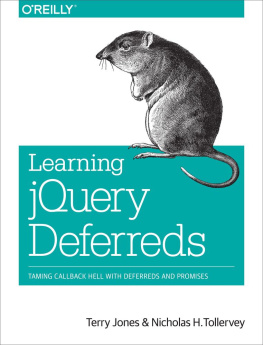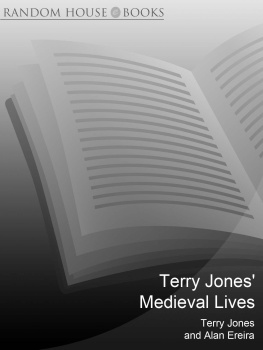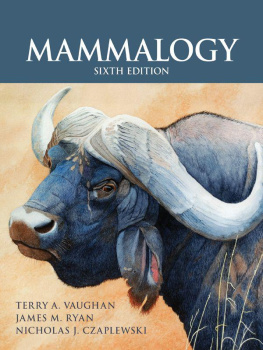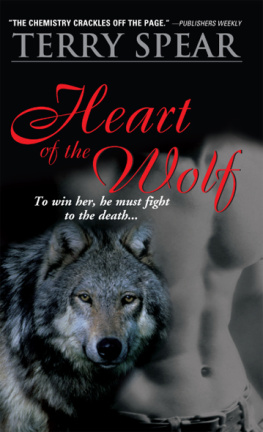Terry Jones - Terry Jones Barbarians
Here you can read online Terry Jones - Terry Jones Barbarians full text of the book (entire story) in english for free. Download pdf and epub, get meaning, cover and reviews about this ebook. year: 2007, publisher: BBC Books, an Imprint of Ebury publishing, genre: History. Description of the work, (preface) as well as reviews are available. Best literature library LitArk.com created for fans of good reading and offers a wide selection of genres:
Romance novel
Science fiction
Adventure
Detective
Science
History
Home and family
Prose
Art
Politics
Computer
Non-fiction
Religion
Business
Children
Humor
Choose a favorite category and find really read worthwhile books. Enjoy immersion in the world of imagination, feel the emotions of the characters or learn something new for yourself, make an fascinating discovery.

- Book:Terry Jones Barbarians
- Author:
- Publisher:BBC Books, an Imprint of Ebury publishing
- Genre:
- Year:2007
- Rating:5 / 5
- Favourites:Add to favourites
- Your mark:
- 100
- 1
- 2
- 3
- 4
- 5
Terry Jones Barbarians: summary, description and annotation
We offer to read an annotation, description, summary or preface (depends on what the author of the book "Terry Jones Barbarians" wrote himself). If you haven't found the necessary information about the book — write in the comments, we will try to find it.
Terry Jones Barbarians — read online for free the complete book (whole text) full work
Below is the text of the book, divided by pages. System saving the place of the last page read, allows you to conveniently read the book "Terry Jones Barbarians" online for free, without having to search again every time where you left off. Put a bookmark, and you can go to the page where you finished reading at any time.
Font size:
Interval:
Bookmark:
TERRY
JONES'
BARBARIANS
Terry Jones is best known as a member of Monty Python, but he has also written four books on medieval England Chaucer's Knight, the highly acclaimed Who Murdered Chaucer?, Crusades and Terry Jones' Medieval Lives, which accompanied a major television series he presented in 2004. He is the author of several children's books including Fairy Tales and Fantastic Stories, The Knight and the Squire and The Lady and the Squire. Terry has also directed several feature films Monty Python and the Holy Grail, The Life of Brian, The Meaning of Life, Personal Services, Erik the Viking and The Wind in the Willows.
Alan Ereira has worked as an award-winning producer and writer of history programmes on radio and television for over 40 years, and has collaborated with Terry for ten years on a number of historical films. His previous books include The People's England, The Invergordon Mutiny, The Heart of the World and (with Terry Jones) Crusades and Terry Jones' Medieval Lives.
This eBook is copyright material and must not be copied, reproduced, transferred, distributed, leased, licensed or publicly performed or used in any way except as specifically permitted in writing by the publishers, as allowed under the terms and conditions under which it was purchased or as strictly permitted by applicable copyright law. Any unauthorised distribution or use of this text may be a direct infringement of the author's and publisher's rights and those responsible may be liable in law accordingly.
ISBN 9781409070429
Version 1.0
www.randomhouse.co.uk
This book is published to accompany the television series Terry Jones'
Barbarians produced by Oxford Film and Television for BBC Television and
first broadcast on BBC2 in 2006.
First published in 2006
This edition published in 2007 by BBC Books, an imprint of Ebury Publishing
10 9 8 7 6 5 4
Ebury Publishing is a division of the Random House Group Ltd.
Copyright Eegg Features Ltd and Sunstone Films 2006
The moral rights of the authors have been asserted.
This electronic book is sold subject to the condition that it shall not by way of trade or otherwise, be lent, resold, hired out, or otherwise circulated without the publisher's prior consent in any form other than that in which it is published and without a similar condition including this condition being imposed on the subsequent purchaser
The Random House Group Ltd Reg. No. 954009
Addresses for companies within the Random House Group Ltd can be found
at www.randomhouse.eo.uk
A CIP catalogue record for this book is available from the British Library.
ISBN: 9781409070429
Version 1.0
Commissioning editors: Sally Potter and Martin Redfern
Project editor: Cameron Fitch
Copy editor: Esther Jagger
Designer: Martin Hendry
Maps by HL Studios, Long Hanborough, Oxon
Picture researcher: Caroline Wood
Production: David Brimble
It took some nerve to write this book and the TV series associated with it. It embraces over 700 years of history on three continents, and involves us striding into the territory of many dedicated and highly impressive scholars.
But it's been a bit of an obsession. We first proposed a TV series on this subject to the BBC in 1997 and have been coming back pretty much every year. And for some reason it's a subject that stirs the passions. What other TV project would have four grown men shouting angrily in an office over the significance of a gerundive in a line of Tacitus?
Terry Jones' Barbarians is about all those peoples whom the Romans wrote off as uncivilized, but it's also a chance to take a look at the Romans themselves from an alternative point of view from the point of view of the people they trashed. And as such it fits into a thesis we've been banging on about in Terry Jones' Medieval Lives and in Terry's radio series The Anti-Renaissance Show. That thesis is that we've all been sold a false history of Rome that has twisted our entire understanding of our own history glorifying (and glossing over) a long era of ruthless imperial power, celebrating it for the benefit of Renaissance tyrants and more modern empires, and wildly distorting our view of the so-called 'Middle Ages' and of the peoples whom Rome crushed and who were then blamed for its fall. Oh yes, and it includes a few measured comments on the Church while we're at it.
We are certainly not experts in the field, and we are indebted to the many real scholars and historians who have allowed us to pick their brains and stomp all over their patch in our inevitably heavy boots. Many thanks to all of them for being so tolerant and generous with their advice. We should particularly like to thank Dr Walter Pohl for his helpful comments, Dr Peter Heather for taking the time to explore answers to our occasionally obsessive questions, Dr Hartmut Ziche and, above all, Professor Barry Cunliffe, whose kindness in carefully steering us away from some real mistakes, and whose unfailing and discreet enthusiasm for the project, have been of enormous help. To all these people: our apologies.
We owe a huge debt of gratitude to the TV production team, especially Nick Kent of OFTV, who managed to get the BBC and the History Channel to sign up to the project and watched over it with a fatherly eye; to David McNab, the series editor; to the producer/directors Rob Coldstream and David Wilson (who had to master a vast amount of material and wrestle with us in the heat of pseudo-academic passion); and to the production assistants and researchers Clare Lynch, Susannah Davis and Sarah Veevers.
If you treat this book as a Lego construction, take it apart and reassemble it in chronological order, you will find a story that goes from the first stirrings of Rome around the fifth century BC through to the last Roman emperor nearly 1000 years later. But there will be odd-shaped gaps, and a number of left-over pieces scattered around the floor. This isn't a history of Rome, and the narrative here is a different one from the others that have been written.
There are, of course, hundreds of books in English covering the period, but no general look at it from a non-Roman perspective. The 'barbarians' of the early period, through to the first century AD, have been written about in books specifically on individual societies mostly Celts and Germans. For the later period, the general reader has had to browse among a series of huge narratives written in the shadow of Gibbon's great Decline and Fall of the Roman Empire. The people whom the Romans called Barbarians are either on the periphery of the main story, or come into it as invaders.
But we're looking at the world they created and inhabited, and it's Rome that is the intruder, or, later, their sometime host, sometime prey. Our interest in Rome lies less in what these people did to the Empire than in what the Empire did to them. And since 'they' are actually the people who created the world we live in, this becomes quite literally a question of 'What did the Romans ever do for us?' The answer, as you will have already figured, is not usually very nice.
So what we have constructed here is not a chronological journey through the Empire's history. We have, instead, chosen to survey the non-Roman world in four sections.
In Part One the world of the Atlantic Celts is traced from its fullest flowering in the first century BC through to its final destruction by Roman armies 200 years later. We then look at the failure of the Roman state in Celtic territory during the third century, and the steady breakdown that led to the re-emergence of a separate Atlantic world in the old Celtic lands.
Part Two is about German territory (in which we include Dacia) and the Germans. So we look at the way in which the Germans resisted Roman occupation in the first century AD, the great civilization of Dacia, which Rome extinguished in the second century, and then the Goths and their attempts to integrate themselves into the Empire in the fourth and early fifth centuries.
Font size:
Interval:
Bookmark:
Similar books «Terry Jones Barbarians»
Look at similar books to Terry Jones Barbarians. We have selected literature similar in name and meaning in the hope of providing readers with more options to find new, interesting, not yet read works.
Discussion, reviews of the book Terry Jones Barbarians and just readers' own opinions. Leave your comments, write what you think about the work, its meaning or the main characters. Specify what exactly you liked and what you didn't like, and why you think so.

